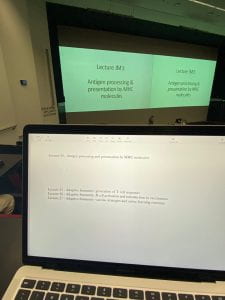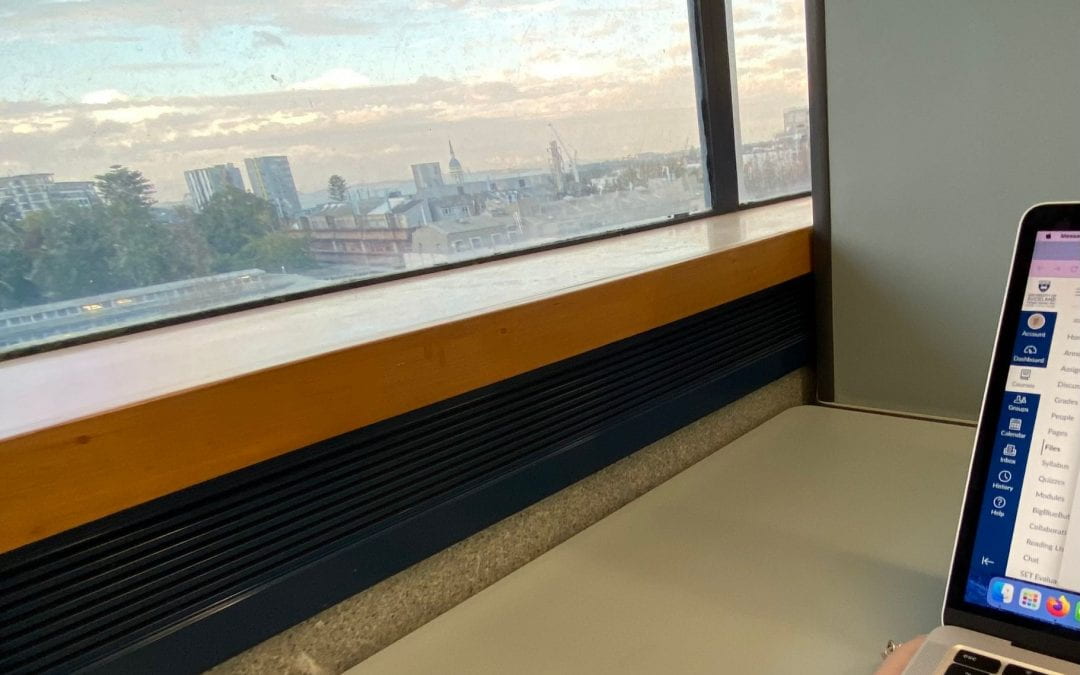One of the biggest challenges about coming to uni is knowing how to study and what the learning environment is actually like. I remember in year 13, one of my teachers said that one lecture is like learning a whole NCEA internal’s worth of content – and while I can’t deny that there can be a lot of content, there are ways to keep on top of it.
First things first – there are a couple of ways that you learn at uni: lectures, tutorials, and labs. Some classes will have only lectures, some will have lectures and labs, some lectures and tutorials.
Lectures
A lecture is usually an hour long session, though sometimes it can be two hours (with a break in the middle). This is when a lecturer will present content, and this is when you would make notes. Sometimes they may be interactive, with quizzes, Slido and Kahoots included, but the majority of it will be the lecturer teaching content for the session. Lectures are usually recorded and released within a day or two afterwards.

An immunology lecture from Biosci 201 – definitely one of my favourite topics!
Tutorials
A tutorial is more like a classroom, with around 20 people in the tutorial stream. This is led by a TA (teaching assistant), and you discuss content in a group setting and work on problems/practise questions. It’s the perfect opportunity to talk to and work with other students and ask the TA any questions you might have. Tutorials are usually 1 hour long.
Labs
Lab sessions are usually found in science subjects. This is where you conduct practical experiments related to the content you learn in lectures. Sometimes there may be a pre-lab quiz or assignment to complete, and there may be a worksheet or write-up/report to submit during the lab, or afterwards – this will all be laid out in the course syllabus/outline on Canvas (sort of like Google Classroom). Labs are usually 3 hours long – but it always goes pretty fast!

The fish I dissected in Biosci 108!
So now that you’re caught up on how teaching works, here are my tips for learning at UoA:
– Lecture slides are usually posted on Canvas – if the slides have a lot of text on them, I like to prepare for the lecture by going over these slides and taking notes. I find that it helps to have some idea of the content before the lecturer goes in-depth during the session
– Sometimes, lab content may be examinable – or at the very least, lab content will be important for writing the worksheet or report. Some labs may start with a demo or talk on the content and experiment, so it can be useful to bring a blank piece of paper (phones and laptops are not good to use in lab, unless you’re told otherwise) to scribble any notes on that the TA might say helps you write the report or understand the content in general.
– Keep on top of readings – readings are posted on Canvas under a reading lists section. While readings may not be compulsory for some courses, they can help aid your understanding when you don’t fully understand a concept, or need a different explanation of the topic – the readings can be a super useful resource for understanding
– Take notes well – in high school, you may not have had to take notes on content, especially as much content as a lecture has. No matter what software you use to take notes, my greatest piece of advice is to write with proper sentences. The amount of times that I have had to go back to a lecture and rewatch it, just because my notes were straight gibberish and not in proper sentences is quite a lot 😬
– It helps to make a note of what you didn’t understand during a lecture and come back to it soon after – when you go back to revise for exams or a test, it helps when you have a good set of notes and you understand the content, so you can focus on applying your knowledge
– Always ask questions – at uni, you are in charge of your learning. If you don’t understand, asking questions is how you will figure out content. During labs and tutorials you can ask TAs, and you can ask lecturers on Piazza [a forum for uni courses, sort of like Reddit – you can ask anonymously too!] or by attending office hours
– Sometimes, you will have to miss a lecture – staying on top of content and lectures as they come, ASAP, is key. Watching the recordings as soon as you can ensures you don’t fall down a slippery slope of having a pile of lectures to watch close to a test or exam.
Knowing how learning works is great – but an important part of uni is also assessments. Assessments can be things like tests and exams, written assignments, quizzes and lab reports, and even spoken exams for language learning courses! Naturally, a scary part of uni is assessment, but again – staying on top of it and knowing what to expect helps a lot.
– A big difference from high school is that there is a variety of question types in assessments – you can have MCQ/multiple choice questions, SAQ/short answer questions, LAQ/long answer questions, and essays. But be warned – MCQ does not necessarily mean easier!
– It might seem a bit obvious, but keep track of your dates. Whether you do this in a physical diary or a calendar app, knowing when things are due helps you plan how to spend your time studying and preparing.
– Especially in the online space during the pandemic, exams may be online beyond 2022. Online exams are conducted on a website called Inspera, and the majority of exams are non-invigilated, which means that nobody is watching you – you are expected to uphold academic conduct. Exams are therefore open book – but again, this does not always make it easier. Exam questions tend to be written to test your understanding and knowing how to apply content, rather than simple recall of facts.
– Courses often have a final lecture which goes over what to expect in the exam – so you will know exactly what sort of questions to expect, and maybe some hints on how to prepare.
– Each lecture will have a set of learning objectives – you’ll know if you understand the content if you can answer the learning objectives.
– A good first step to studying for exams is to have a good set of notes – you might have to rewatch lectures, revise readings and fill in any gaps in your understanding first.
– A key to studying is being able to recall facts – it might not be very efficient to rewrite notes and highlight them. You could practise recalling information by writing your own exam questions and answering them, or using flashcards. Personally, I like to write down everything I can remember about a topic from memory and then fill in what I missed from my notes, as well as answering the learning objectives without my notes. Everyone has a method that works for them – it might take a bit of trial and error to find what this is!
– Stay calm – uni can seem super intimidating and scary with all of the assessments and content thrown at you, but as long as you stay on top of it and try your best, you’ll nail it.
– Most importantly, take time out for yourself. You can’t work with a frazzled, burnt-out brain, and it makes uni much less enjoyable. I’m sure you’ve heard it before, but make sure to sleep properly, eat well, get fresh air, stay hydrated, and make time for things you enjoy – it makes all the difference.

Getting in information by osmosis is the best exam strategy
And that’s my quick crash course on learning at uni! Hope it helps ☺️
